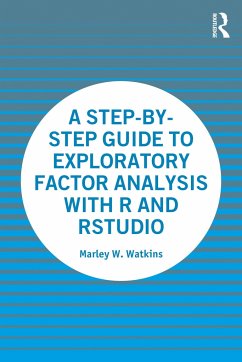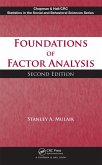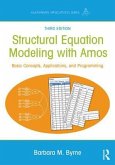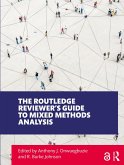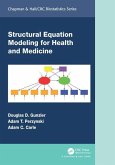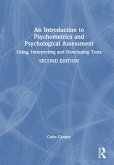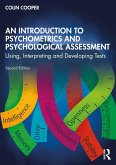Marley Watkins
A Step-by-Step Guide to Exploratory Factor Analysis with R and RStudio
Marley Watkins
A Step-by-Step Guide to Exploratory Factor Analysis with R and RStudio
- Broschiertes Buch
- Merkliste
- Auf die Merkliste
- Bewerten Bewerten
- Teilen
- Produkt teilen
- Produkterinnerung
- Produkterinnerung
This is a concise, easy to use, step-by-step guide for applied researchers conducting exploratory factor analysis (EFA) using the open source software R.
Andere Kunden interessierten sich auch für
![Foundations of Factor Analysis Foundations of Factor Analysis]() Stanley A MulaikFoundations of Factor Analysis125,99 €
Stanley A MulaikFoundations of Factor Analysis125,99 €![Factor Analysis and Dimension Reduction in R Factor Analysis and Dimension Reduction in R]() G. David GarsonFactor Analysis and Dimension Reduction in R101,99 €
G. David GarsonFactor Analysis and Dimension Reduction in R101,99 €![Structural Equation Modeling With AMOS Structural Equation Modeling With AMOS]() Barbara M. ByrneStructural Equation Modeling With AMOS61,99 €
Barbara M. ByrneStructural Equation Modeling With AMOS61,99 €![The Routledge Reviewer's Guide to Mixed Methods Analysis The Routledge Reviewer's Guide to Mixed Methods Analysis]() The Routledge Reviewer's Guide to Mixed Methods Analysis69,99 €
The Routledge Reviewer's Guide to Mixed Methods Analysis69,99 €![Structural Equation Modeling for Health and Medicine Structural Equation Modeling for Health and Medicine]() Douglas D. GunzlerStructural Equation Modeling for Health and Medicine49,99 €
Douglas D. GunzlerStructural Equation Modeling for Health and Medicine49,99 €![An Introduction to Psychometrics and Psychological Assessment An Introduction to Psychometrics and Psychological Assessment]() Colin CooperAn Introduction to Psychometrics and Psychological Assessment172,99 €
Colin CooperAn Introduction to Psychometrics and Psychological Assessment172,99 €![An Introduction to Psychometrics and Psychological Assessment An Introduction to Psychometrics and Psychological Assessment]() Colin CooperAn Introduction to Psychometrics and Psychological Assessment87,99 €
Colin CooperAn Introduction to Psychometrics and Psychological Assessment87,99 €-
-
-
This is a concise, easy to use, step-by-step guide for applied researchers conducting exploratory factor analysis (EFA) using the open source software R.
Produktdetails
- Produktdetails
- Verlag: Taylor & Francis Ltd
- Seitenzahl: 184
- Erscheinungstermin: 30. Dezember 2020
- Englisch
- Abmessung: 527mm x 151mm x 17mm
- Gewicht: 336g
- ISBN-13: 9780367634681
- ISBN-10: 0367634686
- Artikelnr.: 60353316
- Herstellerkennzeichnung
- Libri GmbH
- Europaallee 1
- 36244 Bad Hersfeld
- gpsr@libri.de
- Verlag: Taylor & Francis Ltd
- Seitenzahl: 184
- Erscheinungstermin: 30. Dezember 2020
- Englisch
- Abmessung: 527mm x 151mm x 17mm
- Gewicht: 336g
- ISBN-13: 9780367634681
- ISBN-10: 0367634686
- Artikelnr.: 60353316
- Herstellerkennzeichnung
- Libri GmbH
- Europaallee 1
- 36244 Bad Hersfeld
- gpsr@libri.de
Marley W. Watkins earned a Ph.D. in Educational Psychology and Measurements with a specialty in School Psychology from the University of Nebraska-Lincoln, USA. He is currently Research Professor in the Department of Educational Psychology at Baylor University, USA, and has authored more than 200 articles, books, and chapters and presented more than 150 papers at professional conferences.
Preface
1. Introduction
2. Data
3. R and RStudio Software
4. Importing and Saving Data and Results
5. Decision Steps in Exploratory Factor Analysis
6. Step 1: Variables to Include
7. Step 2: Participants
8. Step 3: Data Screening
9. Step 4: Is Exploratory Factor Analysis Appropriate
10. Step 5: Factor Analysis Model
11. Step 6: Factor Extraction Method
12. Step 7: How Many Factors to Retain
13. Step 8: Rotate Factors
14. Step 9: Interpret Exploratory Factor Analysis Results
15. Step 10: Report Exploratory Factor Analysis Results
16. Exploratory Factor Analysis with Categorical Variables
17. Higher-order and Bifactor Models
18. Exploratory Versus Confirmatory Factor Analysis
Practice Exercises
References and resources
1. Introduction
2. Data
3. R and RStudio Software
4. Importing and Saving Data and Results
5. Decision Steps in Exploratory Factor Analysis
6. Step 1: Variables to Include
7. Step 2: Participants
8. Step 3: Data Screening
9. Step 4: Is Exploratory Factor Analysis Appropriate
10. Step 5: Factor Analysis Model
11. Step 6: Factor Extraction Method
12. Step 7: How Many Factors to Retain
13. Step 8: Rotate Factors
14. Step 9: Interpret Exploratory Factor Analysis Results
15. Step 10: Report Exploratory Factor Analysis Results
16. Exploratory Factor Analysis with Categorical Variables
17. Higher-order and Bifactor Models
18. Exploratory Versus Confirmatory Factor Analysis
Practice Exercises
References and resources
Preface
1. Introduction
2. Data
3. R and RStudio Software
4. Importing and Saving Data and Results
5. Decision Steps in Exploratory Factor Analysis
6. Step 1: Variables to Include
7. Step 2: Participants
8. Step 3: Data Screening
9. Step 4: Is Exploratory Factor Analysis Appropriate
10. Step 5: Factor Analysis Model
11. Step 6: Factor Extraction Method
12. Step 7: How Many Factors to Retain
13. Step 8: Rotate Factors
14. Step 9: Interpret Exploratory Factor Analysis Results
15. Step 10: Report Exploratory Factor Analysis Results
16. Exploratory Factor Analysis with Categorical Variables
17. Higher-order and Bifactor Models
18. Exploratory Versus Confirmatory Factor Analysis
Practice Exercises
References and resources
1. Introduction
2. Data
3. R and RStudio Software
4. Importing and Saving Data and Results
5. Decision Steps in Exploratory Factor Analysis
6. Step 1: Variables to Include
7. Step 2: Participants
8. Step 3: Data Screening
9. Step 4: Is Exploratory Factor Analysis Appropriate
10. Step 5: Factor Analysis Model
11. Step 6: Factor Extraction Method
12. Step 7: How Many Factors to Retain
13. Step 8: Rotate Factors
14. Step 9: Interpret Exploratory Factor Analysis Results
15. Step 10: Report Exploratory Factor Analysis Results
16. Exploratory Factor Analysis with Categorical Variables
17. Higher-order and Bifactor Models
18. Exploratory Versus Confirmatory Factor Analysis
Practice Exercises
References and resources

